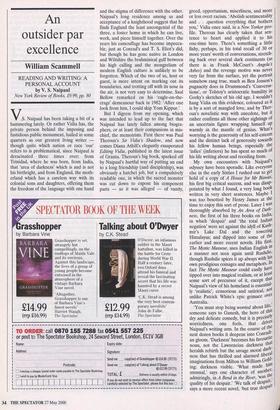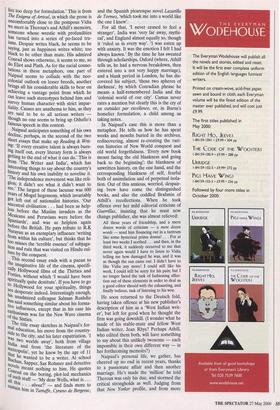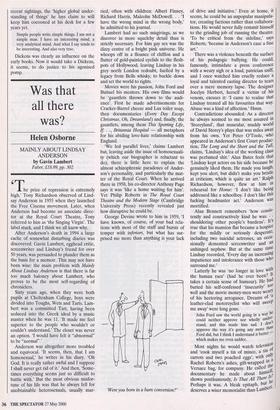An outsider par excellence
William Scammell
READING AND WRITING: A PERSONAL ACCOUNT by V. S. Naipaul New York Review of Books, £9.99, pp. 80 VS. Naipaul has been taking a bit of a hammering lately. Or rather Vidia has, the private person behind the imposing and fastidious public monument, hailed in some quarters as our greatest living writer though quite which nation or race 'our' refers to is problematical, since Naipaul is deracinated three times over: from Trinidad, where he was born, from India, that 'area of darkness' which is and is not his birthright, and from England, the moth- erland which has a careless way with its colonial sons and daughters, offering them the freedom of the language with one hand and the stigma of difference with the other. Naipaul's long residence among us and acceptance of a knighthood suggest that he finds England the least uncongenial of the three, a foster home in which he can live, work, and piece himself together. Over the years his camouflage has become impecca- ble, just as Conrad's and T. S. Eliot's did, but though he has gone native in London and Wiltshire the brahminical gulf between his high calling and the mongrelism of modern English culture is unlikely to be forgotten. Which of the two of us, host or guest, is more intent on marking out its boundaries, and trotting off with its nose in the air, is not very easy to determine. Saul Bellow remarked on his 'eagle-on-the- crags' demeanour back in 1982: 'After one look from him, I could skip Yom Kippur.'
But I digress from my opening, which was intended to lead up to the fact that Naipaul has lately fallen among biogra- phers, or at least their companions in mis- chief, the memoirists, First there was Paul Theroux's Sir Vidia's Shadow, and now comes Diana Athill's elegantly exasperated Editing Vidia, published in the latest issue of Granta. Theroux's big book, sparked off by Naipaul's hurtful way of putting an end to a long friendship (and discipleship), was obviously a hatchet job, but a compulsively readable one, in which the sacred monster was cut down to expose his component parts — so it was alleged — of vanity, greed, opportunism, miserliness, and more or less overt racism. 'Abolish sentimentality and . . .question everything that bothers you,' Vidia once said, in a New Yorker pro- file. Theroux has clearly taken that sen- tence to heart and applied it to his one-time hero. There's something a little fishy, perhaps, in his total recall of 30 or more years' worth of conversations, stretch- ing back over several dark continents (as there is in Frank McCourt's Angela's Ashes) and the revenge motive was never very far from the surface, yet the portrait somehow rang true, much as Ben Jonson's pugnacity does in Drummond's 'Conversa- tions', or Tolstoy's aristocratic humility in Gorky's sketches of his old age. I wouldn't hang Vidia on this evidence, coloured as it is by a sort of mangled love, and by Ther- oux's novelistic way with anecdote, but it rather confirms all those other sightings of an uncertain figure wrapping himself up warmly in the mantle of genius. What's worrying is the generosity of his self-esteem and the distinct lack of generosity towards his fellow human beings, especially the 'idles' (inferiors) he has spent so much of his life writing about and recoiling from. My own encounters with Naipaul's odyssey have been sporadic. Like everyone else in the early Sixties I rushed out to get hold of a copy of A House for Mr Biswas, his first big critical success, and was disap- pointed by what I found, a very long book written in very short sentences. Maybe I was too besotted by Henry James at the time to enjoy this sort of prose. Later I was thoroughly absorbed by An Area of Dark- ness, the first of his three books on India, in which 'despair' and 'the total Indian negation' were set against the idyll of 1Cash- mir's Lake Dal and the towering Himalayas; and dipped into some of the earlier and more recent novels. His first, The Mystic Masseur, uses Indian English in a manner not seen again until Rushdie, though Rushdie spices it up always with his own prodigious coinages and metaphors. In fact The Mystic Masseur could easily have tipped over into magical realism, or at least some sort of precursor of it, except that Naipaul's view of his homeland is essential- ly 'realistic', censorious and satirical, not unlike Patrick White's epic grimace over Australia. `You must stop being worried about life; someone says to Ganesh, the hero of this dry and delicate comedy, but it is precisely worriedness, one feels, that drives Naipaul's writing arm. In the course of the next dozen books it deepens into Conradi- an gloom. `Darkness' becomes his favourite noun, not the Lawrencian darkness that heralds rebirth but the savage moral dark' ness that has thrilled and alarmed liberal imaginations from Milton to William Gold- ing: darkness visible. 'What made hini unusual,' says one character of another, admiringly, in A Bend in the River, 'was tile, quality of his despair.—We talk of despair' says a more recent novel, 'but true despair lies too deep for formulation.' This is from The Enigma of Arrival, in which the prose is uncomfortably close to the pompous Vidia we meet in Theroux's and Athill's memoirs, someone whose wrestle with profundities has turned into a series of po-faced tru- isms. Despair writes black, he seems to be saying, just as happiness writes white; too black to be other than mute. His admired Conrad shows otherwise, it seems to me, so do Eliot and Plath. As for the racial conno- tations in these metaphors, one part of Naipaul seems to collude with the neo- colonial outlook on lesser breeds, another brings all his considerable skills to bear on achieving a vantage point from which he can leave such stereotypes behind him and survey human character with strict impar- tiality. Causes are anathema to him, as they are said to be to all serious writers though no one seems to bring up Othello's famous speech in this context. Naipaul anticipates something of his own decline, perhaps, in the second of the two short essays that make up Reading & Writ- ing: 'If every creative talent is always burn- ing itself out, every literary form is always getting to the end of what it can do.' This is from 'The Writer and India', which has interesting things to say about the country's history and his own inability to novelise it. The independence movement was like reli- gion; it didn't see what it didn't want to see: The largest of these lacunae was 600 Years of Mogul hegemony, which invariably got left out of nationalist histories. 'Our ancestral civilisation . . had been as help- less before the Muslim invaders as the Mexicans and Peruvians were before the Spaniards', and was as helpless again before the British. He pays tribute to R.K Narayan as an exemplary influence 'writing from within his culture', but thinks that he too misses the 'terrible essence' of subjuga- tion and ruin that was visited on Hindu cul- ture by the conquest. This second essay ends with a paean to the unaginative life of the cinema, specifi- c,HY Hollywood films of the Thirties and Forties, without which 'I would have been spiritually quite destitute'. If you have to go to Hollywood for your spirituality, things are desperate indeed. Interestingly enough, his admired colleague Salman Rushdie , said something similar about his forma- tive influences, except that in his case his enthusiasm was for the New Wave cinema of the Sixties. The title essay sketches in Naipaul's for- m. al education, his move from the country- side to the city, and his later expatriation. 'I India two worlds away', both from village "mia and from 'the literature of the Metropolis', yet he knew by the age of 11 he wanted to be a writer. At school Buchan, Sapper, Sax Rohmer and detective hovels meant nothing to him. He quotes onrad on the boring, plot-led mechanics such stuff — 'My dear Wells, what is . . . s t his s . about?' — and finds more to usiam him in Tartuffe, Cyrano de Bergerac, and the Spanish picaresque novel Lazarillo de Tonnes, 'which took me into a world like the one I knew'.
For all that, 'I never ceased to feel a stranger'. India was 'very far away, mythi- cal', and England almost equally so, though it 'ruled us in every way'. 'I was eaten up with anxiety. It was the emotion I felt I had always known.' By the time he has sweated through scholarships, Oxford (where, Athill tells us, he had a nervous breakdown, then entered into a not very happy marriage), and a blank period in London, he has dis- covered his subject, 'those two spheres of darkness', by which Conradian phrase he means a half-remembered India and the `colonial world of our city'. Camus never rates a mention but clearly this is the cry of an outsider par excellence, or, in Burns's homelier formulation, a child among us taking notes.
In Naipaul's case this is more than a metaphor. He tells us how he has spent weeks and months buried in the archives, rediscovering, almost re-creating the vari- ous histories of New World conquest and old world forgetfulness. 'Every new book meant facing the old blankness and going back to the beginning': the blankness of unwritten history, on the one hand, and the corresponding blankness of self, fearful both of assimilation and of perpetual isola- tion. Out of this anxious, worried, despair- ing brew have come the distinguished books, and also the coddled Brahmin of Athill's recollections. When he took offence over her mild editorial criticism of Guerrillas, insisting that he must now change publisher, she was almost relieved:
All those years of friendship, and a mere dozen words of criticism — a mere dozen
words — send him flouncing out in a tantrum
like some hysterical prima donna! . . . For at
least two weeks I seethed ... and then, in the
third week, it suddenly occurred to me that
never again would I have to listen to Vidia
telling me how damaged he was, and it was
as though the sun came out. I didn't have to like Vidia any more! I could still like his work, I could still be sorry for his pain; but I
no longer faced the task of fashioning affec- tion out of these elements in order to deal as a good editor should with the exhausting, and finally tedious, task of listening to his woe.
He soon returned to the Deutsch fold, having taken offence at his new publisher's description of him as a 'West Indian writ- er', but left for good when he thought the firm was going downhill. (I wonder what he made of his stable-mate and fellow West Indian writer, Jean Rhys? Perhaps Athill, who edited them both, will have something to say about this unlikely twosome — each impossible in their own different way — in her forthcoming memoirs?) Naipaul's personal life, we gather, has cheered up no end in recent years, thanks to a passionate affair and then another marriage. He's made the 'million' he told Theroux was only his due, and stormed the critical strongholds as well. Judging from that New Yorker profile, and from more recent sightings, the 'higher global under- standing of things' he lays claim to will keep him cocooned at his desk for a few years yet.
Simple people write simple things. I am not a simple man. I have an interesting mind, a very analytical mind. And what I say tends to be interesting. And also very true.
Dickens was clearly an influence on the early books. Now it would take a Dickens, it seems, to do justice to his agonised pomp.




































































 Previous page
Previous page